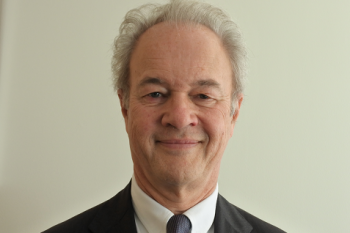Events
Strong Economy Fostered by Advanced Welfare System and Individualism
— Japan and Sweden will celebrate the 150th anniversary of diplomatic relations this year. How would you observe the development of our bilateral ties?
We have intensified our economic relations considerably. The Swedish industries are well established in Japan; and there are considerable Japanese investments in Sweden in the areas including research and technological innovations. Our exports to Japan increased by 37% in 2017, particularly in the pharma field. In addition to R&D-based areas, forestry products are important because those account for more than 10% of our total sales to Japan. We have closer interchange in the academic field, and the 2018 anniversary celebration will dynamize it even more. Another lively area is “lifestyle” which includes design, outdoors, etc., as well as social development, diversity, gender issues, and aging society that are of much interest to Japan. There are many government-to-government dialogues in defense, foreign affairs, and industrial cooperation; and we are also negotiating agreements concerning social security, student working visas, etc. We hope that the negotiation of the working holiday program, which is taking much time, will be concluded soon.
— As Ambassador to Japan, what is your priority agenda for further deepening and developing relations between the two countries?
The immediate priority is to facilitate further mutual investments. We are encouraging new partnerships in the economic area. A program called MIRAI connects 15 Swedish and Japanese universities for joint research; and progress has been made in the area of aging societies. Sweden is also promoting two new Japan-EU agreements, EPA and SPA, which are close to be signed. An expected effect of the EPA will be a marked reduction of custom tariffs in the forestry sector. In the non-tariff area, a difficult problem is to open the public procurement procedure in Japan and Europe. It is important to eliminate non-tariff barriers in the railway, automotive, and medical technology sectors. Prime Minister Abe has clearly stated that he wants to sharpen the Japanese economy by gradually exposing it to more competition; and he’s honoring it through the EPA and TPP11. We feel lucky to celebrate the 150th anniversary this year. The Swedish industry is recognizing the relative importance of Japan, based on Japan’s stability and the difficulties in China.
— Sweden is known for its advanced science and technology and moving to a post-industrial society successfully. What is the secret of success?
The Swedish model owes its success to the combination of the advanced welfare system and a certain kind of individualism. Individuals can take on challenges and are allowed to fail while they are protected by the social security. The fiscal proportion of the economy is about 40% in Japan whereas it is about 50% in Sweden. Although small, the difference is psychologically significant. Sweden has free education, and our main concern is the quality of our schooling system. Relating to this is the issue with newer immigrants, such as integrating them into the workforce and whether to lower the hurdle for them to attain full-wage jobs. The unemployment rate among immigrants is higher than that for those born in Sweden, which is creating a new divide in our society.
— As in Japan, Sweden is also aging. How is Sweden working on a declining birthrate and aging society?
Our population is actually increasing. But we have the aging society, in which extending a healthy and active life with limited economic resources is a big issue. And this is where Japan, in which people live even longer, and Sweden should engage in mutual learning. The secret is the public health system in the broader sense, which is traditionally one of Sweden’s strengths. But we must learn from Japan about nutrition and the natural way of tactile care based on the Japanese bathing customs. Also, some research shows that, when a society matures, women can successfully pursue both a career and motherhood, the birth rate goes up. After women started joining the workforce in the 1950s, the birth rate went down in Sweden; but it is back at 1.9%, and the population grew to over ten million. This is because women can be confident that they can pursue a satisfactory career while their children will be taken care of by the society.
— While the shape of Brexit is not clear, what is Ambassador’s view about its impact on Sweden?
Brexit is very bad news and a loss for Sweden. The UK is a huge market, and we have been allies on many issues within the EU. The UK is one of our biggest trading partners; and there are ninety thousand Swedes living there. We must defend the integrity that we have achieved with other EU member states. We are hoping for some reasonable solution in the Brexit negotiation between the UK and the EU, and reconstruction of a close relationship with the UK. The EU may be able to move forward with deeper integration after Brexit. In terms of free trade, the EU has a mechanism in place with Norway, Turkey, Canada, etc. and that may be used as a model for a future UK-EU free trade agreement.
(Interview by Shu Tamaru, FEC Counsellor)
